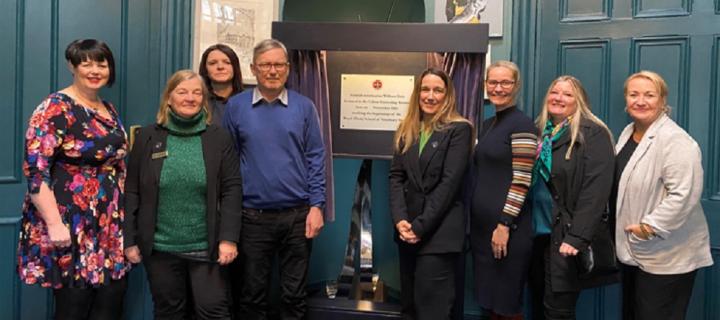Plaque commemorates site of School’s first lecture
Edinburgh restaurant celebrates historical connection with School as location of inaugural lessons.

The site of the first veterinary lecture by the founder of the Royal (Dick) School of Veterinary Studies, William Dick, has been commemorated with a plaque.
The Carlton Convening Rooms on Waterloo Place in Edinburgh was the location of Professor Dick’s first veterinary lecture, on Monday 24 November 1823.
Some 200 years later, the building, which now houses a restaurant, displays a plaque that pays tribute to Professor Dick and celebrates the connection between this iconic building and the School's rich history.
Historic connection
The owner of Howies restaurant, David Howie Scott, was unaware of the connection between the building and the School until he was contacted by historians from the University.
Staff from the School enjoyed a meal at Howies to mark the unveiling of the plaque, which reads ‘Scottish veterinarian William Dick lectured in the Calton Convening Rooms here on 24 November 1823 marking the beginnings of the Royal (Dick) School of Veterinary Studies’.
The plaque will be displayed outside the room where the School's first lectures were held, an area now used as the restaurant’s private dining room.
The site features in the Dick Vet Way – a walking tour that explores the history of the School in Edinburgh city centre, which was produced as part of the bicentenary celebrations.
School’s founder
William Dick was born in Edinburgh in 1793. The son of a farrier, he had a love of horses and science, particularly anatomy. He attended comparative anatomy lectures at Edinburgh Medical School before studying veterinary medicine at the Royal Veterinary College in 1817, completing the course in three months.
William Dick founded the Vet School in 1823. His first lecture was attended by 25 students – mainly farriers and smiths who shared his passion for horses and anatomy. He continued to give lectures at Calton Convening Rooms before commissioning a building to house teaching in Clyde Street, which opened in 1833. The School then moved to new premises at Summerhall in 1916, and relocated to Easter Bush Campus in 2011.
Bicentenary celebrations
The unveiling of the plaque was one of a series of celebratory events that have been held throughout the School's bicentenary year.
The School hosted the William Dick Memorial lecture, entitled ‘Glancing back but looking forward: 200 years of veterinary science building a future for global impact’ and partnered with local charity Fostering Compassion to host an international ‘Compassion Allways’ conference.
To mark the 200-year anniversary of William Dick’s first lecture, the School hosted an alumni event at Summerhall – the home of the vet school from 1916 – 2011.
At a separate celebration, 400 students, staff, alumni and friends of the School gathered to celebrate and raise money for Dick Vet charity All4Paws at a gala dinner at the National Museum of Scotland.
I am delighted to unveil this plaque, which commemorates such an important part of the School’s 200-year history.
It is wonderful that Howies has agreed to honour the history of the School and its connection to this iconic Edinburgh building in this way.
We are delighted to install a commemorative plaque in our restaurant recognising the historic connection between this building and the vet school.
Related links
About the Royal (Dick) School of Veterinary Studies
The Royal (Dick) School of Veterinary Studies is a one-of-a-kind centre of excellence in clinical activity, teaching and research. Our purpose-built campus, set against the backdrop of the beautiful Pentland Hills Regional Park, is home to more than 800 staff and almost 1400 students, all of whom contribute to our exceptional community ethos.
The School comprises:
The Global Academy of Agriculture and Food Systems
The Hospital for Small Animals
The Jeanne Marchig International Centre for Animal Welfare Education
We represent the largest concentration of animal science-related expertise in Europe, impacting local, regional, national and international communities in terms of economic growth, the provision of clinical services and the advancement of scientific knowledge.


